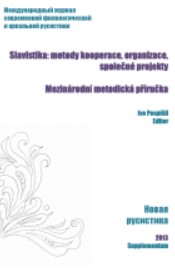Kognitywizm językoznawczy w glottodydaktyce – wskazanie na wybrane rozwiązanie praktyczne
Cognitive linguistics in glottodidactics – pointing out selected practical solutions
Author(s): Dorota ChłopekSubject(s): Semantics, Cognitive linguistics
Published by: Česká asociace slavistů
Keywords: cognitive linguistics; semantics; cognitive grammar; symbolic assembly; construction; culture;
Summary/Abstract: The present article, which is not a strictly glottodidactic text, demonstrates selected findings obtained at high school, through research done by three undergraduate students, guided by the author of the present article. In each case, the students based their research upon two groups: a control group and an experimental group. The former group learned new linguistic constructions from their regular textbooks and workbooks. The latter group had basic instruction from their teacher pertaining to numerous assumptions of cognitive linguists. The instructor referred to the constructionist approach to grammar within cognitive linguistics and she explained new linguistic constructions to the learners using the encyclopaedic approach to meaning followed by cognitive linguists. The undergraduates employed the basic tenets of cognitive linguistics in their instruction with the experimental group. The control group learned through rules and definitions. The control test results of the three cited BA theses show that the experimental group received better grades than the control group soon after the new material had been introduced and after the summer holidays when they were administered a distance test. The experimental group learned with awareness of conventiona-lized linguistic constructions, through schemas and relations to their encyclopaedic knowledge grown out of the “natural” context provided by different interesting and up-to-date extracts of text accessed through the Internet. Such learning, to a certain degree, follows the three phases of the system for cultural cognition proposed by Leonard Talmy (see 2000a): acquisition of culture, exercise and imparing of culture. It is recommended that teachers of English as a foreign language should refer to the conventionalized nature of grammar through numerous carefully chosen extracts of text in their teaching practice. This challenging topic requires further study and research.
Journal: Новая русистика
- Issue Year: VI/2013
- Issue No: Suppl.
- Page Range: 35-45
- Page Count: 12
- Language: Polish

